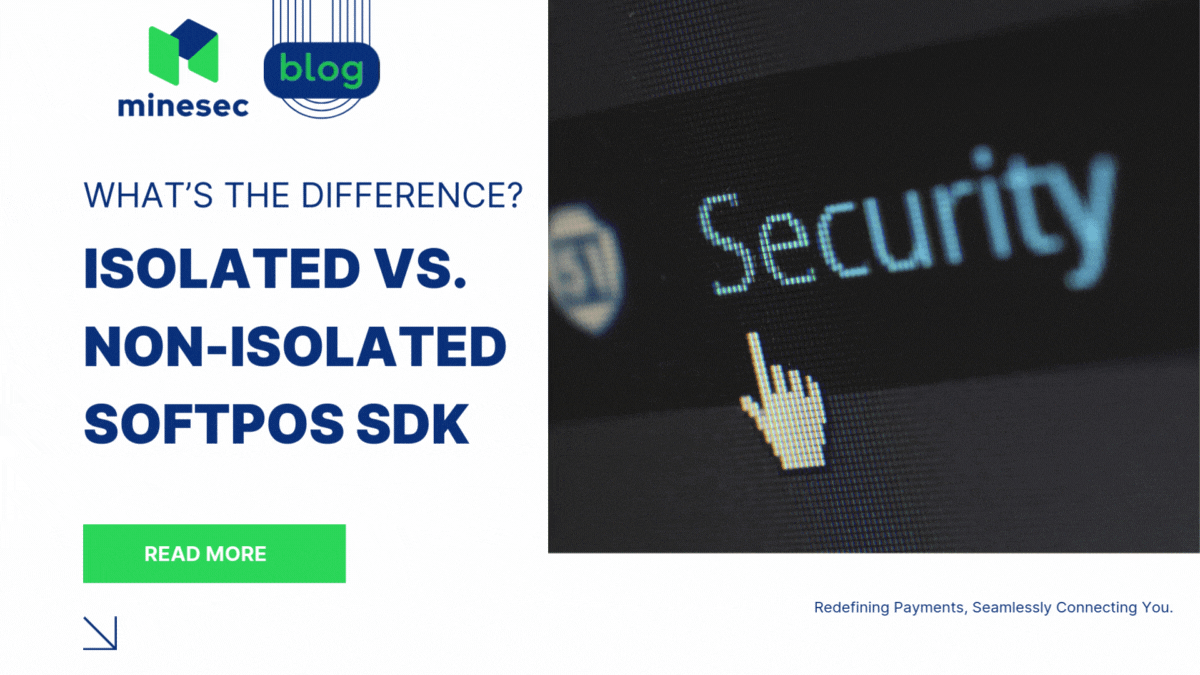A SoftPOS SDK (Software Development Kit) is a crucial component that enables businesses to transform their NFC-enabled mobile devices into functional POS terminals that can accept contactless payments. These SDKs provide the necessary tools and APIs for developers to build customized SoftPOS applications.
When selecting a SoftPOS SDK, understanding the distinction between isolated and non-isolated SDKs is crucial, and both offer distinct advantages and disadvantages.
In this article, we will delve into the key differences between these two types of SDKs, helping you make an informed choice depending on your specific requirements and priorities.
Isolated SoftPOS SDKs
Isolated SDKs create a secure, self-contained environment within the host application. This isolation ensures that the SoftPOS functionality operates independently, minimizing the risk of conflicts or interference with other components of the host app. Sensitive payment data remains protected from potential vulnerabilities and unauthorized access.
Key features and benefits of isolated SDKs include:
- Enhanced security: The isolated environment ensures that sensitive payment data remains segregated from the rest of the host application, minimizing the risk of exposure to vulnerabilities or unauthorized access. They are less susceptible to malware attacks as malicious code are prevented from spreading to other parts of the system.
- Platform independence: Isolated SDKs are designed to be compatible with a wide range of operating systems and devices, offering greater flexibility for deployment. As new platforms and devices emerge, isolated SDKs can be adapted to ensure continued compatibility.
- Compliance: Many regulatory bodies prefer isolated SDKs due to their enhanced security measures.
At the same time, isolated SDKs can also present certain challenges:
- Complexity: Implementing an isolated SDK may require more technical expertise and development effort.
- Performance overhead: The additional security measures can sometimes impact performance, especially on older or less powerful devices.
Non-Isolated SoftPOS SDKs
Non-isolated SDKs integrate directly with the host application’s environment, sharing resources and potentially exposing sensitive data. While this approach can be simpler to implement, it comes with increased security risks:
- Vulnerability to attacks: The shared environment makes the application more susceptible to malware and other threats, as malicious code can potentially exploit vulnerabilities in the host application or operating system.
- Data exposure: Sensitive payment data may be exposed to other parts of the application or the device’s operating system, increasing the risk of unauthorized access or data breaches.
- Additional security protection: Using non-isolated SDK will require the developer and integrator to develop additional security protection to achieve the same level of security protection as an isolated SDK does.
- Platform dependence: Non-isolated SDKs are often more tightly coupled to specific platforms, making it challenging to port them to different operating systems or devices. This can limit their flexibility and adaptability to evolving market needs and trends.
On the bright side, non-isolated SDKs can offer:
- Simplified development: Integration is generally easier compared to isolated SDKs as there is no need to create a separate execution environment.
- Potential performance benefits: The shared environment can sometimes lead to improved performance.
Which is Better: Isolated or Non-Isolated?
The choice between isolated and non-isolated SoftPOS SDKs depends on several factors:
- Security requirements: If protecting sensitive payment data is a top priority, an isolated SDK is generally the safer option.
- Development resources: If your development team has limited experience with security measures, a non-isolated SDK might be easier to implement.
- Performance considerations: If performance is critical, you may need to evaluate the trade-offs between security and speed for both types of SDKs. A non-isolated SDK might be suitable, but only if you can adequately address security concerns.
- Regulatory compliance: Ensure that your chosen SDK complies with relevant industry standards and regulations.
In most cases, an isolated SoftPOS SDK is the preferred foundation for applications that prioritize security and flexibility. While isolated SDKs can introduce additional complexity and potentially impact performance, the benefits in terms of security, platform independence, and compliance often outweigh the drawbacks.
Ready to Elevate Your Payments Experience?
Our PCI MPoC certified SoftPOS Isolated SDK offers advanced security, simplified compliance, accelerated development, and enhanced customer trust. Our SDK empowers you to confidently build secure and compliant mobile payment acceptance solutions and deliver exceptional payment experiences.
Contact us today to learn more about how MineSec can empower your payments acceptance experience.
Download MineSec Isolated SDK brochure now!

